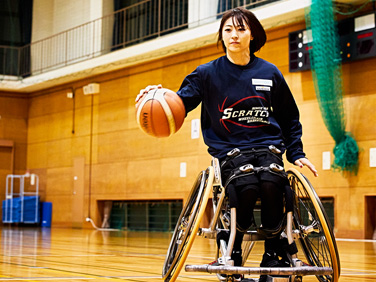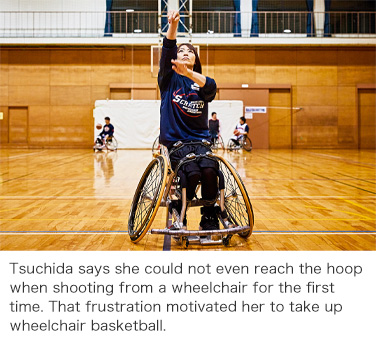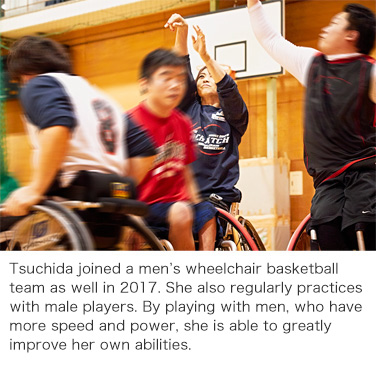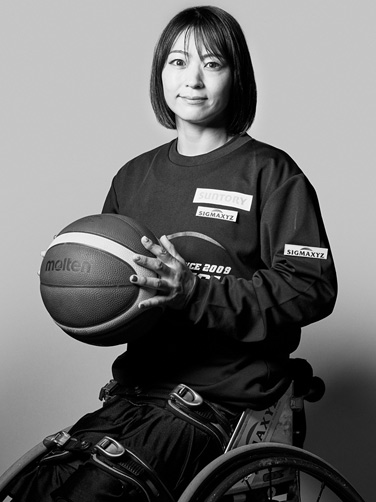Vol.7 Mayumi Tsuchida
Thereʼs no wall thatʼs too high to climb

Mayumi Tsuchida
(Wheelchair basketball player)
At the fundamental level, sports provides an entertaining way for people to compete against each other in physical one-upmanship. But sports can also have a deeper impact, providing opportunities for personal growth and social transformation. Athletes have more than just fun on their minds as they entertain spectators with their physical feats; they also have broader goals and visions they hope to achieve through sports.
One athlete who embodies this characterization is womenʼs wheelchair basketball player Mayumi Tsuchida. Her physical disability once caused her to doubt herself, but now she pursues her dreams with fervor, driven by a personal mantra that "thereʼs no wall thatʼs too high to climb". Currently, she is busy preparing to shine on her biggest stage yet—the Tokyo Paralympics.
(Wheelchair basketball player)
At the fundamental level, sports provides an entertaining way for people to compete against each other in physical one-upmanship. But sports can also have a deeper impact, providing opportunities for personal growth and social transformation. Athletes have more than just fun on their minds as they entertain spectators with their physical feats; they also have broader goals and visions they hope to achieve through sports.
One athlete who embodies this characterization is womenʼs wheelchair basketball player Mayumi Tsuchida. Her physical disability once caused her to doubt herself, but now she pursues her dreams with fervor, driven by a personal mantra that "thereʼs no wall thatʼs too high to climb". Currently, she is busy preparing to shine on her biggest stage yet—the Tokyo Paralympics.

An athlete who embodies contrasts
As you watch Tsuchida adeptly control the ball with her hands, one thing you might notice is the strikingly cute artwork on her fingernails.
"When you play basketball, the skin on the palms becomes thicker, and your hands turn rugged", Tsuchida says with a slightly embarrassed smile. "By doing my nails, I get to add just a bit of softness!"
Tsuchida embodies contrasts in other ways as well. On the court, where she trains with a menʼs team, she is poised and dynamic. Off the court, she is warm and laidback.
Tsuchida says that as a child, she excelled at sports and wanted to become a sports trainer when she grew up. She didn't encounter wheelchair basketball until she was at university.
"I was visiting an indoor basketball court when someone from my university invited me to get in a basketball wheelchair and try shooting", she says. "I thought it would be easy, but my shots didn't even reach the hoop. That really frustrated me. If it wasn't for that sense of frustration, I probably would have never ended up getting into wheelchair basketball."
As you watch Tsuchida adeptly control the ball with her hands, one thing you might notice is the strikingly cute artwork on her fingernails.
"When you play basketball, the skin on the palms becomes thicker, and your hands turn rugged", Tsuchida says with a slightly embarrassed smile. "By doing my nails, I get to add just a bit of softness!"
Tsuchida embodies contrasts in other ways as well. On the court, where she trains with a menʼs team, she is poised and dynamic. Off the court, she is warm and laidback.
Tsuchida says that as a child, she excelled at sports and wanted to become a sports trainer when she grew up. She didn't encounter wheelchair basketball until she was at university.
"I was visiting an indoor basketball court when someone from my university invited me to get in a basketball wheelchair and try shooting", she says. "I thought it would be easy, but my shots didn't even reach the hoop. That really frustrated me. If it wasn't for that sense of frustration, I probably would have never ended up getting into wheelchair basketball."

At the time, Tsuchida had no need for a wheelchair in her daily life. Although she had a congenital hip joint malformation and she had been told might affect her ability to walk in the future, Tsuchida did not feel any pain from her condition and so didn't fully grasp the reality of her situation.
"On an intellectual level, I understood, but I had a hard time accepting the reality", she says."As the condition worsened, I was able to walk less and less until I was forced to rely on a wheelchair. Part of me was hopeful that my condition would eventually improve, but another bigger part of me was worried that I would never be able to walk again. Thatʼs why it hit me hard when I received my disability passbook. Nothing about me had fundamentally changed from the previous day, nor had the condition stricken me all of a sudden. Yet, until the previous day, I had thought I was able-bodied, and now I was suddenly disabled. It took me a while to accept my situation."
As Tsuchida became increasingly pessimistic, she discovered a source of optimism in the same wheelchair basketball that had frustrated her as a university student.
"Wheelchair basketball is very difficult", she says. "When I started, I couldn't dash forward and had a hard time catching up with the ball even if it was right in front of me. I couldn't back up, turn, or even stop. The only way Iʼd stop was by bumping into someone! So, it was challenging, but thatʼs what made it so much fun. Every shot you successfully make feels like a special occasion. Through wheelchair basketball, I've gotten to know people with a variety of disabilities, which helped me accept my own condition and become more optimistic. Thanks to the support and encouragement of so many different people, I've made it this far. You could say that wheelchair basketball saved my life."
"On an intellectual level, I understood, but I had a hard time accepting the reality", she says."As the condition worsened, I was able to walk less and less until I was forced to rely on a wheelchair. Part of me was hopeful that my condition would eventually improve, but another bigger part of me was worried that I would never be able to walk again. Thatʼs why it hit me hard when I received my disability passbook. Nothing about me had fundamentally changed from the previous day, nor had the condition stricken me all of a sudden. Yet, until the previous day, I had thought I was able-bodied, and now I was suddenly disabled. It took me a while to accept my situation."
As Tsuchida became increasingly pessimistic, she discovered a source of optimism in the same wheelchair basketball that had frustrated her as a university student.
"Wheelchair basketball is very difficult", she says. "When I started, I couldn't dash forward and had a hard time catching up with the ball even if it was right in front of me. I couldn't back up, turn, or even stop. The only way Iʼd stop was by bumping into someone! So, it was challenging, but thatʼs what made it so much fun. Every shot you successfully make feels like a special occasion. Through wheelchair basketball, I've gotten to know people with a variety of disabilities, which helped me accept my own condition and become more optimistic. Thanks to the support and encouragement of so many different people, I've made it this far. You could say that wheelchair basketball saved my life."
Training with men to push herself even further
Tsuchida hates to lose, and it was this aspect of her personality that drove her to work hard and improve in wheelchair basketball.
"Iʼm not good at hiding my feelings, and I get easily stressed out", she says. "But every time Iʼm frustrated, I tell myself that thereʼs no wall thatʼs too high to climb. As much as I like being complimented, itʼs my frustration that drives me more. I play on the national team, but I was once dropped from a tournament line-up. That really frustrated me, so I worked hard to make my head coach regret the decision to drop me. As a result, I was back in for the next tournament, and I even earned an MVP."
Wheelchair basketball is a tough sport involving players in wheelchairs moving constantly at high speeds. Collisions inevitably happen. This is why Tsuchida practices with men. By being able to remain calm and play aggressively in the face of men who are bigger than her, she feels she can push herself even further.
"Collisions in wheelchair basketball are no laughing matter", she says. "They can topple you over. But if you flinch at that possibility, you canʼt play your own game. When people watch the sport for the first time, they often say that itʼs a lot more violent than they expected."
Currently, Tsuchida is gearing up for her biggest challenge yet.
"I want to score big at the Tokyo Paralympics", she says. "Thatʼs my biggest goal right now. I want to play well on both the womenʼs and menʼs teams. When I play with men, theyʼre definitely faster and more aggressive than women—and I want to get as close to that level as possible. At this point, Iʼm a veteran, but Iʼm not thinking about retiring yet. The minute I consider retiring, I feel like Iʼll start going easy on myself. I want to be a top-line player until the very end. Sure, some day, Iʼll reach my limits. When that happens, I want to switch my focus to teaching young players about what I went through to get to this point. If I become a teacher, I might discover another aspect of the sport that I like."
"Iʼm not good at hiding my feelings, and I get easily stressed out", she says. "But every time Iʼm frustrated, I tell myself that thereʼs no wall thatʼs too high to climb. As much as I like being complimented, itʼs my frustration that drives me more. I play on the national team, but I was once dropped from a tournament line-up. That really frustrated me, so I worked hard to make my head coach regret the decision to drop me. As a result, I was back in for the next tournament, and I even earned an MVP."
Wheelchair basketball is a tough sport involving players in wheelchairs moving constantly at high speeds. Collisions inevitably happen. This is why Tsuchida practices with men. By being able to remain calm and play aggressively in the face of men who are bigger than her, she feels she can push herself even further.
"Collisions in wheelchair basketball are no laughing matter", she says. "They can topple you over. But if you flinch at that possibility, you canʼt play your own game. When people watch the sport for the first time, they often say that itʼs a lot more violent than they expected."
Currently, Tsuchida is gearing up for her biggest challenge yet.
"I want to score big at the Tokyo Paralympics", she says. "Thatʼs my biggest goal right now. I want to play well on both the womenʼs and menʼs teams. When I play with men, theyʼre definitely faster and more aggressive than women—and I want to get as close to that level as possible. At this point, Iʼm a veteran, but Iʼm not thinking about retiring yet. The minute I consider retiring, I feel like Iʼll start going easy on myself. I want to be a top-line player until the very end. Sure, some day, Iʼll reach my limits. When that happens, I want to switch my focus to teaching young players about what I went through to get to this point. If I become a teacher, I might discover another aspect of the sport that I like."
A desire to expand wheelchair basketball
Tsuchida is the person she is today because she has worked hard for her own well-being, throwing her whole self into wheelchair basketball to wipe away every trace of the doubts caused by her inability to walk. More optimistic than she has ever been, Tsuchida has set her sights on her biggest dream yet.
"There are a lot of people who have never watched a wheelchair basketball game", she says. "In 2021, I hope more people will discover the sport and become fans. I think once they watch a game, theyʼll immediately realize what a fun sport it is. There still arenʼt many indoor courts in Japan where you can play wheelchair basketball. Quite a few courts wonʼt allow us to play, because they think weʼll damage the floor. But once more people learn the truths about wheelchair basketball, I think weʼll see more venues —and more wheelchair users! — embrace the sport. Recently, I've been holding talks at schools in between practice and games. More able-bodied people are playing the sport, too. I hope the environment for wheelchair basketball expands and changes for the better."
It is perhaps because Tsuchida has overcome so many walls in her life that she shines particularly bright as both an athlete and a person.
Hopefully, she will successfully achieve her goals for 2021 and shine more brightly than ever.
"There are a lot of people who have never watched a wheelchair basketball game", she says. "In 2021, I hope more people will discover the sport and become fans. I think once they watch a game, theyʼll immediately realize what a fun sport it is. There still arenʼt many indoor courts in Japan where you can play wheelchair basketball. Quite a few courts wonʼt allow us to play, because they think weʼll damage the floor. But once more people learn the truths about wheelchair basketball, I think weʼll see more venues —and more wheelchair users! — embrace the sport. Recently, I've been holding talks at schools in between practice and games. More able-bodied people are playing the sport, too. I hope the environment for wheelchair basketball expands and changes for the better."
It is perhaps because Tsuchida has overcome so many walls in her life that she shines particularly bright as both an athlete and a person.
Hopefully, she will successfully achieve her goals for 2021 and shine more brightly than ever.

Mayumi Tsuchida
Tsuchida was considered a star of the womenʼs wheelchair basketball scene before she was picked to join the Japanese national team in 2010. She led her team to victory in the 2013 All Japan Womenʼs Wheelchair Basketball Tournament and earned an MVP. In 2017, she joined a menʼs wheelchair basketball team. She is represented by Sigmaxyz.
Words: Kosuke Kawakami Photography: Tsukuru Asada Athlete Beauty Adviser: Masumi Hanada
── MUFG Bank supports the children of our future through the activities of Laureus. ──

